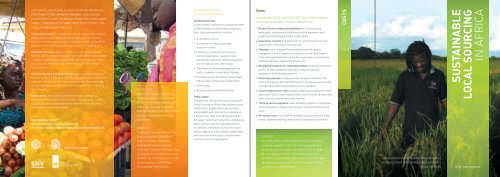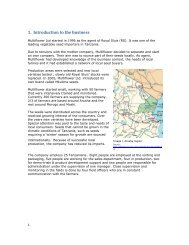Brochure - Local Sourcing
Brochure - Local Sourcing
Brochure - Local Sourcing
Create successful ePaper yourself
Turn your PDF publications into a flip-book with our unique Google optimized e-Paper software.
SUCCESSFUL SUSTAINABLE LOCAL SOURCING INCREASES<br />
PROFITABILITY AND IMPROVES FARMERS’ LIVELIHOODS.<br />
HIGHER PROFITS ARE THE RESULT OF BETTER SUPPLY (MORE<br />
STABLE, HIGHER QUALITY) AND LOWER SUPPLY COSTS. THE<br />
LOCAL FARMERS GAIN THROUGH:<br />
Increased incomes: A competitive price and assistance to increase<br />
productivity and grow higher quality products enhance farmers’<br />
revenues. A higher income in turn improves farmers’ quality of life:<br />
access to better medicine, schooling for children, housing, etc.<br />
Stabilized incomes: Long term sourcing commitments provide<br />
farmers with certainty of revenues. This makes them more resilient.<br />
It enables farmers to plan longer term investments in their farms<br />
(e.g. a tractor) and to take loans from banks. It also increases<br />
food security.<br />
Increased farming and business capacity: <strong>Local</strong> sourcing allows<br />
farmers to acquire new knowledge through training and interaction<br />
with other farmers, service suppliers and banks. This knowledge<br />
can be crop specific or related to cultivation practices or farming<br />
as a business.<br />
Social capital: When small scale farmers start working in a<br />
collective, they strengthen their position. They can scale up their<br />
supplies, access cheaper inputs and negotiate as one business<br />
partner with the buying company.<br />
Want to know more?<br />
Visit our website: local-sourcing.com<br />
or send an email to Marije Boomsma: m.boomsma@kit.nl<br />
Design and production: www.tmdesign.ca<br />
TANZANIA<br />
Multiflower is a Tanzania based<br />
vegetable seeds company. Since<br />
2005 it has sourced locally. As such<br />
it taps into the local market by<br />
offering a product that fits the local<br />
ecological conditions as well as<br />
local tastes.<br />
NAMIBIA<br />
CoolFresh is a trader of fruit. The<br />
main product from Namibia is<br />
grapes for export, but due to<br />
investments made in farmers’<br />
livelihood, CoolFresh has been able<br />
to expand into vegetables for local<br />
markets. By offering farmers a year<br />
round income, CoolFresh has<br />
secured their commitment.<br />
Starting up Sustainable<br />
<strong>Local</strong> <strong>Sourcing</strong> (continued)<br />
Committed farmers<br />
To secure their commitment, companies need<br />
to offer farmers incentives that respond to<br />
their livelihood needs for instance:<br />
• A competitive price;<br />
• Guaranteed markets to provide<br />
a secure income;<br />
• Financing, including crop financing<br />
and cash payments, needed to cover<br />
operational costs and household expenses.<br />
It also helps prevent side selling;<br />
• Training in business and organizational<br />
skills, in addition to technical training;<br />
• Providing quality production inputs helps<br />
reduce costs and increase productivity;<br />
• Certification;<br />
• Business and market information.<br />
Public capital<br />
Compared to regular sourcing, Sustainable<br />
<strong>Local</strong> <strong>Sourcing</strong> in Africa often requires extra<br />
investments. Supply chains are typically<br />
undeveloped and many farmers operate on<br />
a small scale, have little education and do<br />
not apply modern farm practices. Addressing<br />
these issues is not the sole responsibility<br />
of individual companies. It requires a total<br />
system approach that includes collaboration<br />
with and investments by local government<br />
and not for profit organizations.<br />
Costs<br />
IN SUMMARY EXTRA COSTS FOR SETTING UP SUSTAINABLE<br />
LOCAL SOURCING ARE TYPICALLY RELATED TO:<br />
1. Research into ecological possibilities for local sourcing:<br />
developing, testing and introducing the food ingredient and<br />
production technologies locally in pilot plots.<br />
2. Awareness creation and promotion to commit farmers to your<br />
supply chain: field visits, meetings, etc.<br />
3. Training in pre- and post-harvesting techniques, quality<br />
management and (if needed) certification as well as business<br />
skills and organizational training for cooperatives, associations,<br />
marketing groups, community groups, etc.<br />
4. Developing a system for collecting produce: installing collection<br />
points including hardware (storage, simple processing<br />
equipment) and training collectors.<br />
5. Financing schemes: timely payments and pre-financing. This<br />
means managing cash flow differently or setting up new financial<br />
arrangements with local financial service providers.<br />
6. <strong>Local</strong> transportation costs: Despite reducing international freight<br />
and import costs, local transportation costs from the farmers and<br />
their collection points need to be covered.<br />
7. Training service suppliers: such as seeds suppliers, transporters<br />
and local banks in quality requirements, improved logistics and<br />
so on.<br />
8. Personnel costs: extra staff to manage local procurement (field<br />
visits), organize meetings and contract collectors and farmers.<br />
ZAMBIA<br />
YamBEEji Honey and Rice Products Ltd. is a Zambian<br />
company engaged in local rice and honey production.<br />
To set up local sourcing, it needed to hire a number<br />
of field agents to monitor and control production<br />
practices. The producers also needed training to grow<br />
the quality rice required. These were costs that had<br />
not been encountered before.<br />
COSTS<br />
INGREDIENTS FOR SETTING UP A SUSTAINABLE<br />
BUSINESS THAT IS PROFITABLE AND SUPPORTS<br />
LOCAL FARMERS<br />
SUSTAINABLE<br />
LOCAL SOURCING<br />
IN AFRICA<br />
local-sourcing.com
WITH THE EARTH’S POPULATION GROWING, OUR CURRENT<br />
FOOD SUPPLIES WILL SOON BE INSUFFICIENT TO FEED ALL<br />
IN THIS CONTEXT OF GROWING SCARCITY, AFRICA OFFERS<br />
BOTH MARKET AND PRODUCTION OPPORTUNITIES.<br />
The largest population growth will occur in Africa, where at the<br />
moment only 20% of total food production capacity is used.<br />
In a context of scarce supply, short term commodity trade is no<br />
longer the right business model. Companies have discovered that<br />
long term relations are needed to secure the commitment of<br />
supplying farmers. To build successful long term relationships,<br />
companies must address farmers’ needs.<br />
In other words, companies must aim both for profitability and<br />
improving farmers’ livelihoods. This is what Sustainable <strong>Local</strong><br />
<strong>Sourcing</strong> is all about!<br />
With Sustainable <strong>Local</strong> <strong>Sourcing</strong>, a company creates a sustainable<br />
business for its own enterprise as well as local farmers by buying,<br />
processing and marketing products locally or regionally. A sustainable<br />
business for farmers is a long term business that provides incentives<br />
that go beyond a competitive price. Incentives include improved power<br />
distribution in the supply chain through collaboration, building mutual<br />
trust, sharing information and joint investments.<br />
Sustainable <strong>Local</strong> <strong>Sourcing</strong> in Africa does not happen overnight. This<br />
brochure explains the drivers for starting Sustainable <strong>Local</strong> <strong>Sourcing</strong><br />
and the ingredients needed to make it successful.<br />
This brochure is written for companies that want to do<br />
sustainable business in Africa through local sourcing from<br />
local farmers. Written by KIT with support from Agri-ProFocus,<br />
When to do Sustainable <strong>Local</strong> <strong>Sourcing</strong>?<br />
FOR SUCCESSFUL SUSTAINABLE LOCAL SOURCING, COMPANIES<br />
NEED TO BE DRIVEN BY A COMBINATION OF COMMERCIAL AND<br />
SOCIAL OBJECTIVES.<br />
Commercial drivers<br />
Commercial drivers are broadly related to reducing supply chain risks<br />
and to cutting costs.<br />
Securing supply<br />
Being close to the source enables a company to monitor supply and<br />
enhance flexibility with regard to changing orders. For instance when you<br />
need more or different orders, this is more easily and rapidly organized<br />
with suppliers that are located nearby. Moreover close relationships<br />
support mutual trust and discourages the producer from side selling.<br />
Cutting input costs<br />
For companies that are currently importing, local sourcing eliminates<br />
import related costs including:<br />
• International freight costs;<br />
• Clearance costs;<br />
• Currency exchange costs;<br />
• Costs related to time delays in global sourcing;<br />
• Costs due to theft which occurs frequently in cross border trade.<br />
Controlling quality<br />
Direct relationships with producers enable you to better monitor quality<br />
in the supply chain, identify bottlenecks creating quality inconsistencies<br />
and collaborate closely to improve quality. Freight transport in many<br />
African countries is risky in terms of quality consistency, especially with<br />
perishables. The less distance travelled the better.<br />
National policies<br />
National governments in Africa increasingly promote use of local inputs.<br />
These policies are created to stimulate the local economy. In countries<br />
such as in Nigeria, these policies have been translated into national laws.<br />
WHEN TO DO SUSTAINABLE<br />
LOCAL SOURCING?<br />
SIERRA LEONE<br />
Sierra Leone Breweries Limited,<br />
owned by Heineken, has a number of<br />
social drivers to source locally. First,<br />
its goal is to support local social and<br />
economic development by involving<br />
local farmers. A second social driver is<br />
to show goodwill towards the national<br />
government and the third one is to<br />
enhance Heineken’s global reputation.<br />
ZAMBIA<br />
Frontier Milling, a rice milling<br />
company in Zambia that is supported<br />
by various Agri-ProFocus members,<br />
sources its rice from the Chambeshi<br />
Flood Plains located 100 km from the<br />
company. Although imported rice is<br />
still cheaper, direct contact with<br />
producers has led to greater certainty<br />
and predictably of supply.<br />
Social drivers: contributing<br />
to poverty reduction<br />
Contributing to the economic development<br />
of your suppliers is a social driver of<br />
successful Sustainable <strong>Local</strong> <strong>Sourcing</strong>.<br />
This social driver can be triggered by<br />
both a sense of human responsibility<br />
as well as corporate image building.<br />
Contributing to poverty reduction helps<br />
companies improve their image among<br />
local farmers, agri-food suppliers and<br />
potential local consumers. This<br />
demonstration of corporate social<br />
responsibility also appeals to consumers<br />
in global markets, local policy makers<br />
and civil society organizations.<br />
SUPPORT<br />
The case studies all received<br />
financial or in-kind support to set<br />
up local sourcing.<br />
Sierra Leone Breweries Limited was<br />
supported by a fund from CFC. The<br />
NGO EU-cord was responsible for<br />
the implementation of the program<br />
to train the farmers.<br />
Both YamBEEji and Frontier Milling<br />
were supported by Agri-ProFocus<br />
including SNV, a development NGO,<br />
to assist farmers in upgrading<br />
rice production.<br />
CoolFresh Namibia received a fund<br />
Starting up Sustainable <strong>Local</strong> <strong>Sourcing</strong><br />
THE DRIVERS AND AMBITIONS ARE CLEAR, BUT WHAT SUCCESS<br />
FACTORS ARE NEEDED TO ACHIEVE THESE AMBITIONS?<br />
General conditions<br />
Market demand<br />
As with all business models, Sustainable<br />
<strong>Local</strong> <strong>Sourcing</strong> starts with a sufficient<br />
local market demand. This is true for<br />
companies seeking to start up a business<br />
or to replace imported ingredients<br />
with locally sourced produce (import<br />
substitution) which is generally<br />
considerably less expensive.<br />
Suitable ecological conditions<br />
Before being able to change your<br />
business model to local sourcing, the<br />
food products should be compatible<br />
with local ecological conditions, or<br />
should be substitutable by locally grown<br />
crops. Introducing a new crop requires<br />
sound ecological research, testing and<br />
promotion among local farmers.<br />
Supporting policy environment<br />
A supportive local government and a<br />
politically stable context make it easier and<br />
less risky to set up new business activities.<br />
Basic physical conditions<br />
Basic physical conditions need to be<br />
available: for instance energy and water<br />
supply, roads and telecommunication.<br />
Private capital<br />
Commercial capital is required for<br />
investing in a suppliers’ network,<br />
setting up logistics and quality<br />
management. Examples of costs are<br />
storage and processing facilities,<br />
pre- and post-harvest techniques,<br />
training and transportation.<br />
Sustainability conditions<br />
Deep cultural knowledge and<br />
local networks<br />
Sustainable <strong>Local</strong> <strong>Sourcing</strong> requires<br />
strong relations between the farmer<br />
and your company. This takes time, but<br />
also mutual understanding of each<br />
other’s culture and way of working.<br />
Having local knowledge and networks<br />
before starting up Sustainable <strong>Local</strong><br />
<strong>Sourcing</strong> is a distinct advantage.<br />
IMPACT ON<br />
LIVELIHOODS<br />
The following companies<br />
improved livelihoods by<br />
creating additional income<br />
for farming families:<br />
CoolFresh Namibia (20),<br />
Frontier Milling (33),<br />
Multiflower (300), Sierra<br />
STARTING UP SUSTAINABLE<br />
LOCAL SOURCING<br />
Agentschap NL and SNV, the brochure is based on research<br />
from the Dutch government program<br />
Leone Breweries Limited<br />
consisting of five business cases throughout Africa. More<br />
to support private sector investment<br />
(5,000), YamBEEji Honey and<br />
information can be found at www.local-sourcing.com<br />
(PSI) in developing countries.<br />
Rice Products Ltd. (1,500).




